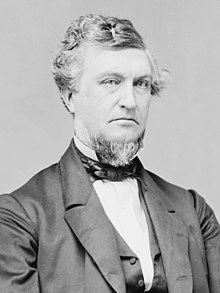Zachariah Chandler | |
|---|---|
 | |
| United States Senator from Michigan | |
| In office February 22, 1879 – November 1, 1879 | |
| Preceded by | Isaac P. Christiancy |
| Succeeded by | Henry P. Baldwin |
| In office March 4, 1857 – March 3, 1875 | |
| Preceded by | Lewis Cass |
| Succeeded by | Isaac P. Christiancy |
| Chair of the Republican National Committee | |
| In office June 1876 – November 1, 1879 | |
| Preceded by | Edwin D. Morgan |
| Succeeded by | J. Donald Cameron |
| 12th United States Secretary of the Interior | |
| In office October 19, 1875 – March 11, 1877 | |
| President | Ulysses S. Grant Rutherford B. Hayes |
| Preceded by | Columbus Delano |
| Succeeded by | Carl Schurz |
| Mayor of Detroit | |
| In office 1851–1852 | |
| Preceded by | John Ladue |
| Succeeded by | John H. Harmon |
| Personal details | |
| Born | December 10, 1813 Bedford, New Hampshire, U.S. |
| Died | November 1, 1879 (aged 65) Chicago, Illinois, U.S. |
| Political party | Whig (before 1854) Republican (1854–1879) |
| Spouse | Letitia Douglas |
| Signature | |
Zachariah Chandler (December 10, 1813 – November 1, 1879) was an American businessman, politician, and one of the founders of the Republican Party, whose radical wing he dominated as a lifelong abolitionist. He was mayor of Detroit, a four-term senator from the state of Michigan, and Secretary of the Interior under President Ulysses S. Grant.
As a successful young businessman in Detroit, Chandler supported the Underground Railroad. During the Civil War, he advocated for the Union war effort, the abolition of slavery, and civil rights for freed African Americans. As Secretary of the Interior, Chandler eradicated serious corruption in the Bureau of Indian Affairs, fully endorsing President Grant's Peace Policy initiative to civilize American Indian tribes. In 1879, he was re-elected U.S. Senator and was a potential presidential candidate, but he died the following morning after giving a speech in Chicago.